Reflective Report on Managing in International Business
VerifiedAdded on 2022/12/15
|11
|2611
|393
AI Summary
This reflective report provides a critical perspective on managing in international business, including teamwork, communication, conflicts, and presentation skills. It discusses the strengths, weaknesses, opportunities, and threats of the author's personality and includes an action plan for future development.
Contribute Materials
Your contribution can guide someone’s learning journey. Share your
documents today.
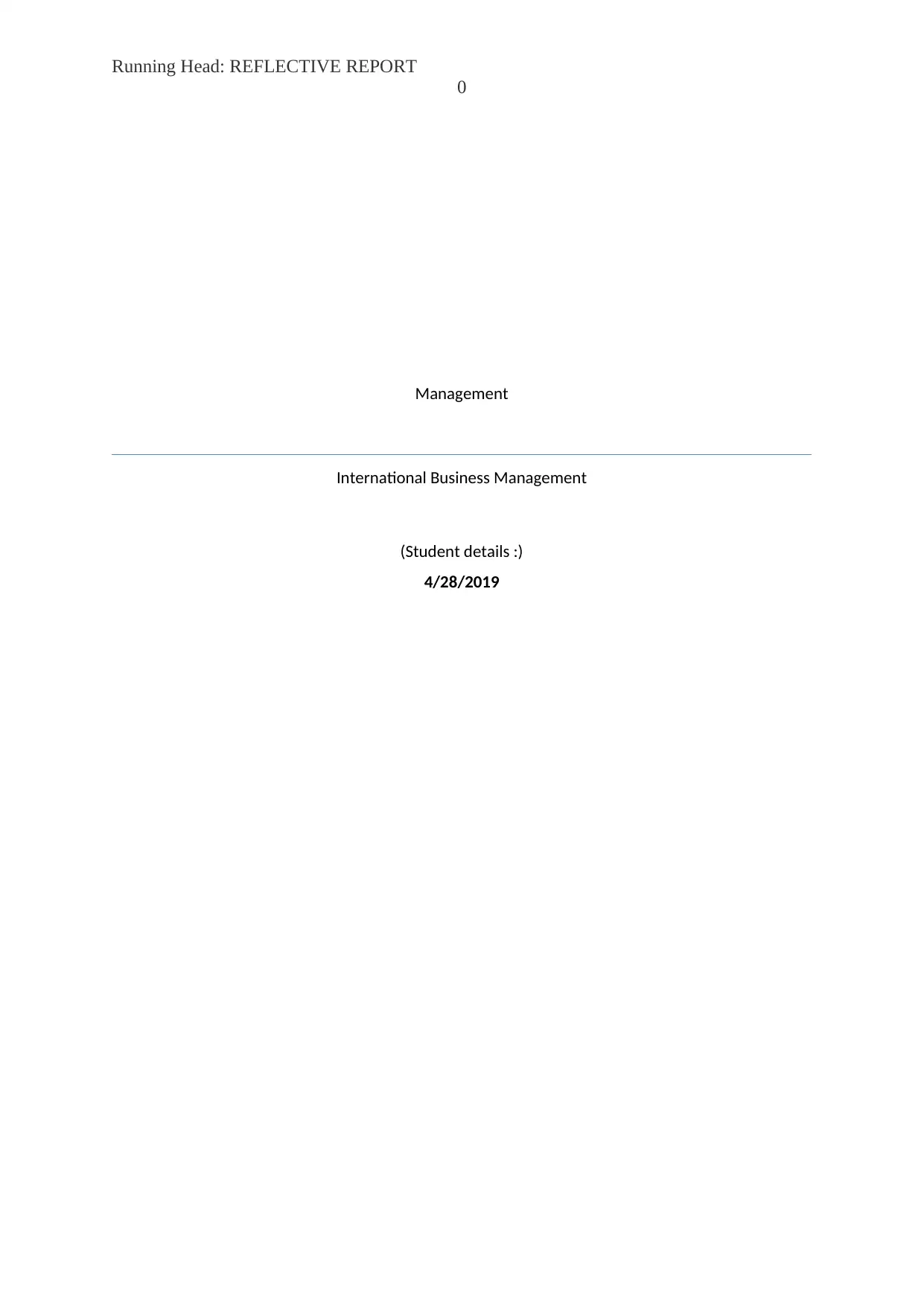
Running Head: REFLECTIVE REPORT
0
Management
International Business Management
(Student details :)
4/28/2019
0
Management
International Business Management
(Student details :)
4/28/2019
Secure Best Marks with AI Grader
Need help grading? Try our AI Grader for instant feedback on your assignments.
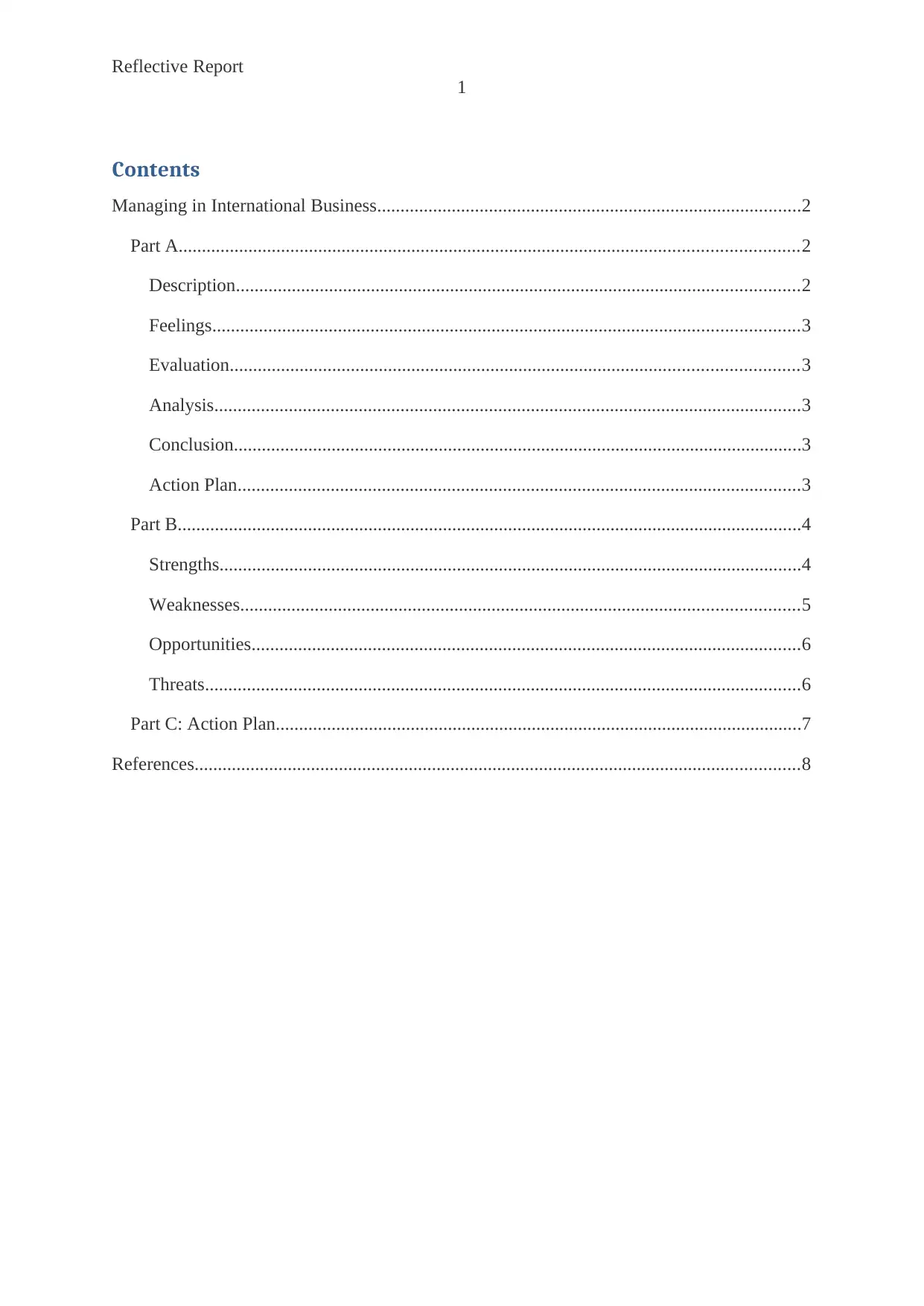
Reflective Report
1
Contents
Managing in International Business...........................................................................................2
Part A.....................................................................................................................................2
Description.........................................................................................................................2
Feelings..............................................................................................................................3
Evaluation..........................................................................................................................3
Analysis..............................................................................................................................3
Conclusion..........................................................................................................................3
Action Plan.........................................................................................................................3
Part B......................................................................................................................................4
Strengths.............................................................................................................................4
Weaknesses........................................................................................................................5
Opportunities......................................................................................................................6
Threats................................................................................................................................6
Part C: Action Plan.................................................................................................................7
References..................................................................................................................................8
1
Contents
Managing in International Business...........................................................................................2
Part A.....................................................................................................................................2
Description.........................................................................................................................2
Feelings..............................................................................................................................3
Evaluation..........................................................................................................................3
Analysis..............................................................................................................................3
Conclusion..........................................................................................................................3
Action Plan.........................................................................................................................3
Part B......................................................................................................................................4
Strengths.............................................................................................................................4
Weaknesses........................................................................................................................5
Opportunities......................................................................................................................6
Threats................................................................................................................................6
Part C: Action Plan.................................................................................................................7
References..................................................................................................................................8
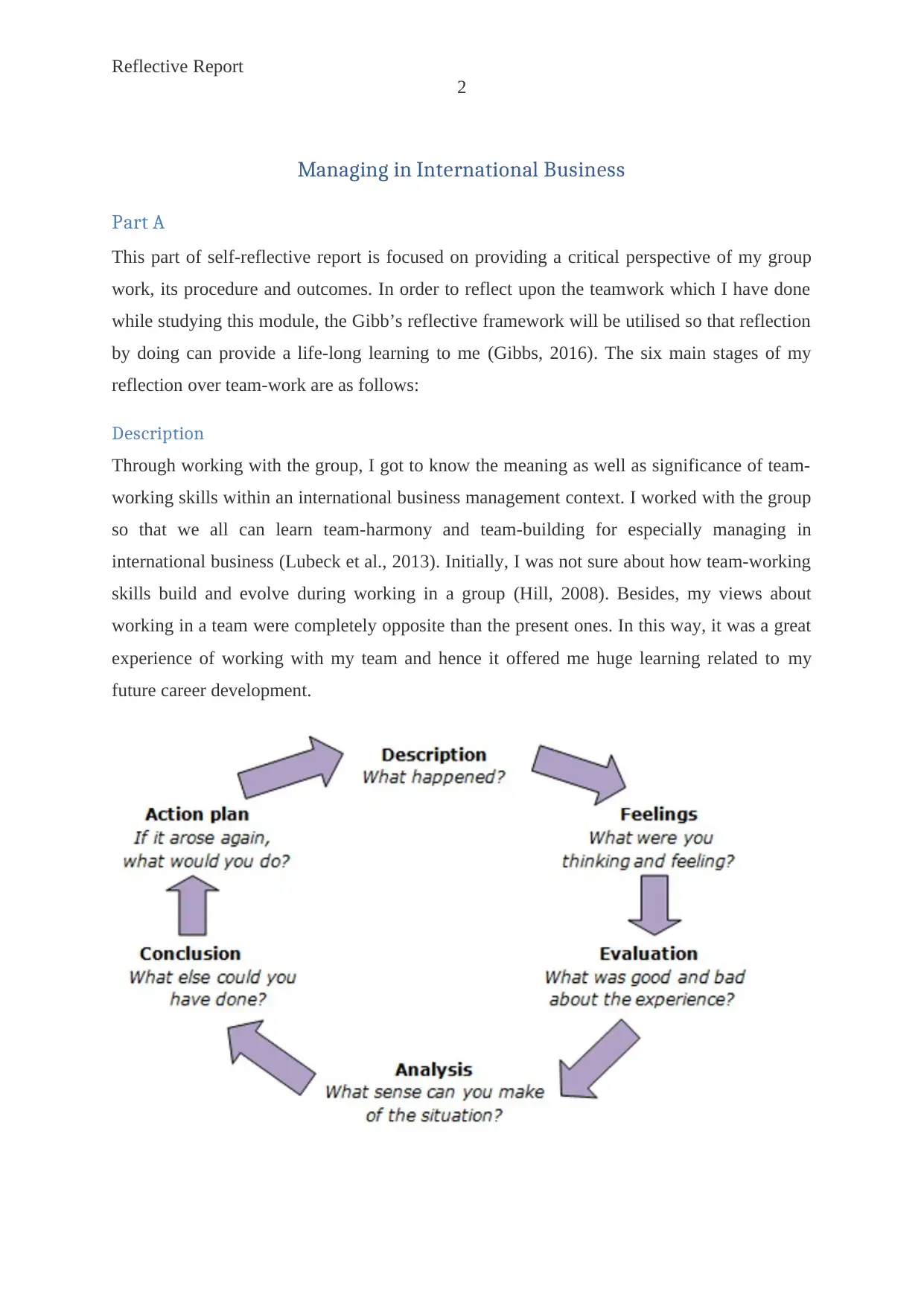
Reflective Report
2
Managing in International Business
Part A
This part of self-reflective report is focused on providing a critical perspective of my group
work, its procedure and outcomes. In order to reflect upon the teamwork which I have done
while studying this module, the Gibb’s reflective framework will be utilised so that reflection
by doing can provide a life-long learning to me (Gibbs, 2016). The six main stages of my
reflection over team-work are as follows:
Description
Through working with the group, I got to know the meaning as well as significance of team-
working skills within an international business management context. I worked with the group
so that we all can learn team-harmony and team-building for especially managing in
international business (Lubeck et al., 2013). Initially, I was not sure about how team-working
skills build and evolve during working in a group (Hill, 2008). Besides, my views about
working in a team were completely opposite than the present ones. In this way, it was a great
experience of working with my team and hence it offered me huge learning related to my
future career development.
2
Managing in International Business
Part A
This part of self-reflective report is focused on providing a critical perspective of my group
work, its procedure and outcomes. In order to reflect upon the teamwork which I have done
while studying this module, the Gibb’s reflective framework will be utilised so that reflection
by doing can provide a life-long learning to me (Gibbs, 2016). The six main stages of my
reflection over team-work are as follows:
Description
Through working with the group, I got to know the meaning as well as significance of team-
working skills within an international business management context. I worked with the group
so that we all can learn team-harmony and team-building for especially managing in
international business (Lubeck et al., 2013). Initially, I was not sure about how team-working
skills build and evolve during working in a group (Hill, 2008). Besides, my views about
working in a team were completely opposite than the present ones. In this way, it was a great
experience of working with my team and hence it offered me huge learning related to my
future career development.
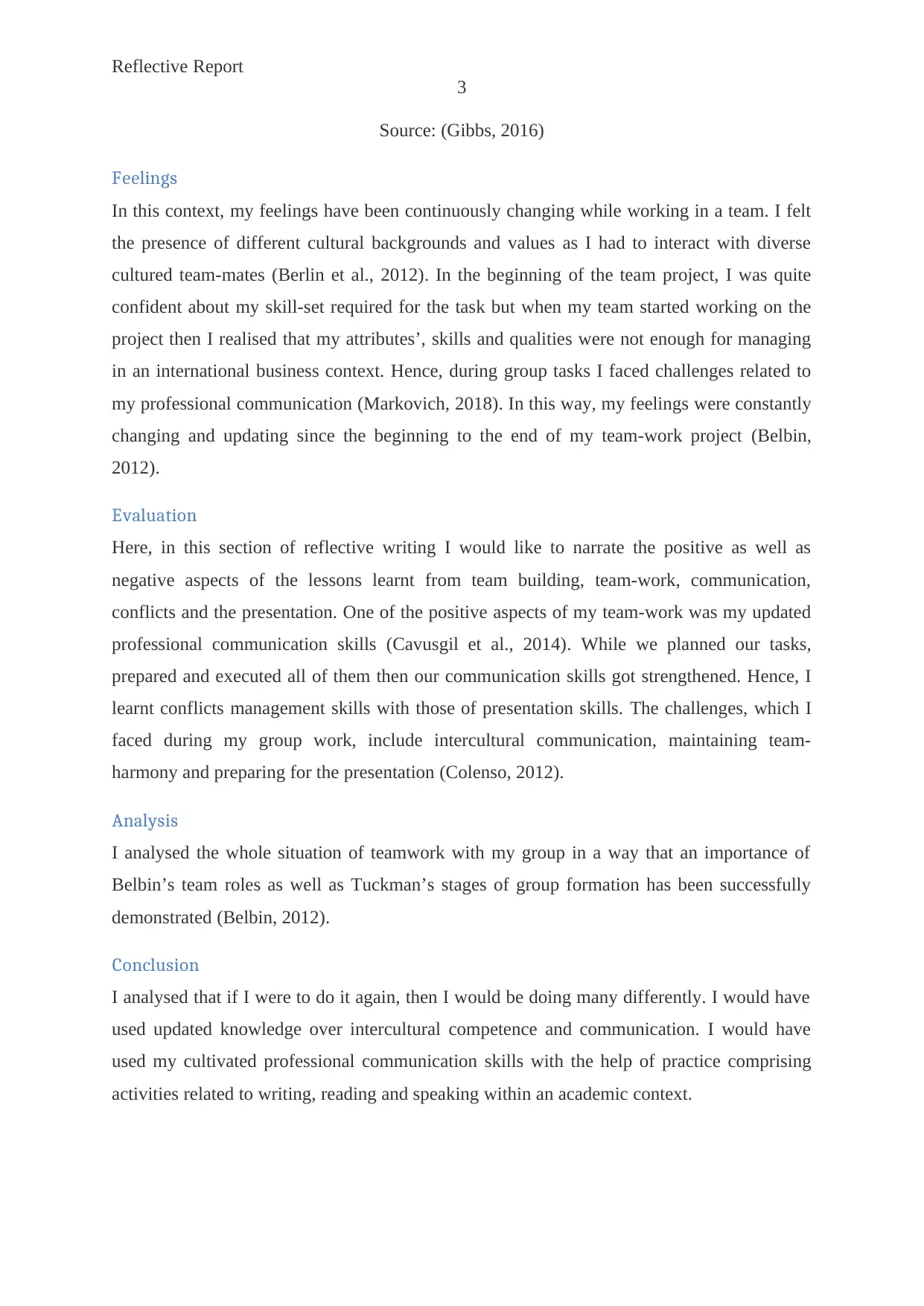
Reflective Report
3
Source: (Gibbs, 2016)
Feelings
In this context, my feelings have been continuously changing while working in a team. I felt
the presence of different cultural backgrounds and values as I had to interact with diverse
cultured team-mates (Berlin et al., 2012). In the beginning of the team project, I was quite
confident about my skill-set required for the task but when my team started working on the
project then I realised that my attributes’, skills and qualities were not enough for managing
in an international business context. Hence, during group tasks I faced challenges related to
my professional communication (Markovich, 2018). In this way, my feelings were constantly
changing and updating since the beginning to the end of my team-work project (Belbin,
2012).
Evaluation
Here, in this section of reflective writing I would like to narrate the positive as well as
negative aspects of the lessons learnt from team building, team-work, communication,
conflicts and the presentation. One of the positive aspects of my team-work was my updated
professional communication skills (Cavusgil et al., 2014). While we planned our tasks,
prepared and executed all of them then our communication skills got strengthened. Hence, I
learnt conflicts management skills with those of presentation skills. The challenges, which I
faced during my group work, include intercultural communication, maintaining team-
harmony and preparing for the presentation (Colenso, 2012).
Analysis
I analysed the whole situation of teamwork with my group in a way that an importance of
Belbin’s team roles as well as Tuckman’s stages of group formation has been successfully
demonstrated (Belbin, 2012).
Conclusion
I analysed that if I were to do it again, then I would be doing many differently. I would have
used updated knowledge over intercultural competence and communication. I would have
used my cultivated professional communication skills with the help of practice comprising
activities related to writing, reading and speaking within an academic context.
3
Source: (Gibbs, 2016)
Feelings
In this context, my feelings have been continuously changing while working in a team. I felt
the presence of different cultural backgrounds and values as I had to interact with diverse
cultured team-mates (Berlin et al., 2012). In the beginning of the team project, I was quite
confident about my skill-set required for the task but when my team started working on the
project then I realised that my attributes’, skills and qualities were not enough for managing
in an international business context. Hence, during group tasks I faced challenges related to
my professional communication (Markovich, 2018). In this way, my feelings were constantly
changing and updating since the beginning to the end of my team-work project (Belbin,
2012).
Evaluation
Here, in this section of reflective writing I would like to narrate the positive as well as
negative aspects of the lessons learnt from team building, team-work, communication,
conflicts and the presentation. One of the positive aspects of my team-work was my updated
professional communication skills (Cavusgil et al., 2014). While we planned our tasks,
prepared and executed all of them then our communication skills got strengthened. Hence, I
learnt conflicts management skills with those of presentation skills. The challenges, which I
faced during my group work, include intercultural communication, maintaining team-
harmony and preparing for the presentation (Colenso, 2012).
Analysis
I analysed the whole situation of teamwork with my group in a way that an importance of
Belbin’s team roles as well as Tuckman’s stages of group formation has been successfully
demonstrated (Belbin, 2012).
Conclusion
I analysed that if I were to do it again, then I would be doing many differently. I would have
used updated knowledge over intercultural competence and communication. I would have
used my cultivated professional communication skills with the help of practice comprising
activities related to writing, reading and speaking within an academic context.
Secure Best Marks with AI Grader
Need help grading? Try our AI Grader for instant feedback on your assignments.
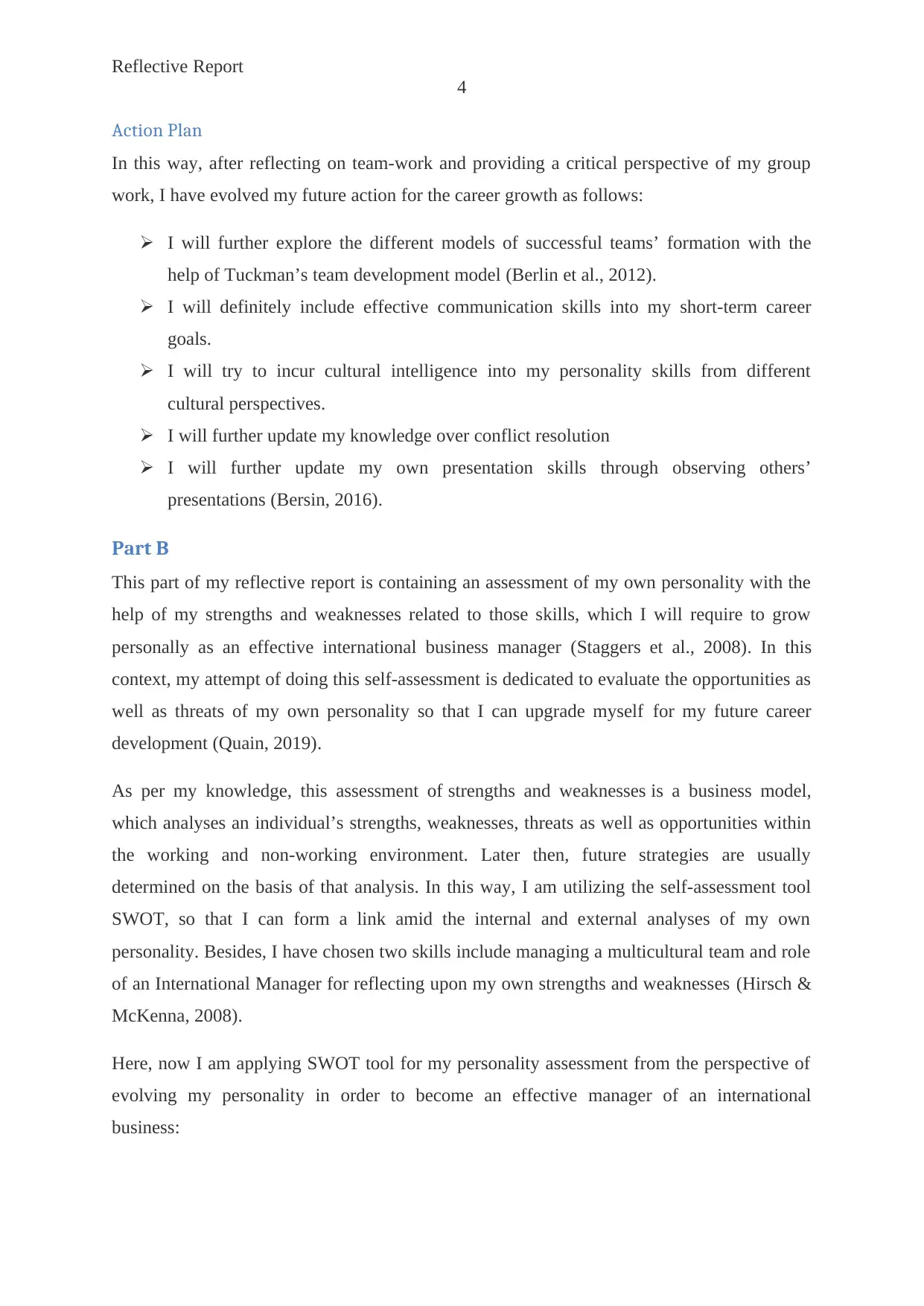
Reflective Report
4
Action Plan
In this way, after reflecting on team-work and providing a critical perspective of my group
work, I have evolved my future action for the career growth as follows:
I will further explore the different models of successful teams’ formation with the
help of Tuckman’s team development model (Berlin et al., 2012).
I will definitely include effective communication skills into my short-term career
goals.
I will try to incur cultural intelligence into my personality skills from different
cultural perspectives.
I will further update my knowledge over conflict resolution
I will further update my own presentation skills through observing others’
presentations (Bersin, 2016).
Part B
This part of my reflective report is containing an assessment of my own personality with the
help of my strengths and weaknesses related to those skills, which I will require to grow
personally as an effective international business manager (Staggers et al., 2008). In this
context, my attempt of doing this self-assessment is dedicated to evaluate the opportunities as
well as threats of my own personality so that I can upgrade myself for my future career
development (Quain, 2019).
As per my knowledge, this assessment of strengths and weaknesses is a business model,
which analyses an individual’s strengths, weaknesses, threats as well as opportunities within
the working and non-working environment. Later then, future strategies are usually
determined on the basis of that analysis. In this way, I am utilizing the self-assessment tool
SWOT, so that I can form a link amid the internal and external analyses of my own
personality. Besides, I have chosen two skills include managing a multicultural team and role
of an International Manager for reflecting upon my own strengths and weaknesses (Hirsch &
McKenna, 2008).
Here, now I am applying SWOT tool for my personality assessment from the perspective of
evolving my personality in order to become an effective manager of an international
business:
4
Action Plan
In this way, after reflecting on team-work and providing a critical perspective of my group
work, I have evolved my future action for the career growth as follows:
I will further explore the different models of successful teams’ formation with the
help of Tuckman’s team development model (Berlin et al., 2012).
I will definitely include effective communication skills into my short-term career
goals.
I will try to incur cultural intelligence into my personality skills from different
cultural perspectives.
I will further update my knowledge over conflict resolution
I will further update my own presentation skills through observing others’
presentations (Bersin, 2016).
Part B
This part of my reflective report is containing an assessment of my own personality with the
help of my strengths and weaknesses related to those skills, which I will require to grow
personally as an effective international business manager (Staggers et al., 2008). In this
context, my attempt of doing this self-assessment is dedicated to evaluate the opportunities as
well as threats of my own personality so that I can upgrade myself for my future career
development (Quain, 2019).
As per my knowledge, this assessment of strengths and weaknesses is a business model,
which analyses an individual’s strengths, weaknesses, threats as well as opportunities within
the working and non-working environment. Later then, future strategies are usually
determined on the basis of that analysis. In this way, I am utilizing the self-assessment tool
SWOT, so that I can form a link amid the internal and external analyses of my own
personality. Besides, I have chosen two skills include managing a multicultural team and role
of an International Manager for reflecting upon my own strengths and weaknesses (Hirsch &
McKenna, 2008).
Here, now I am applying SWOT tool for my personality assessment from the perspective of
evolving my personality in order to become an effective manager of an international
business:
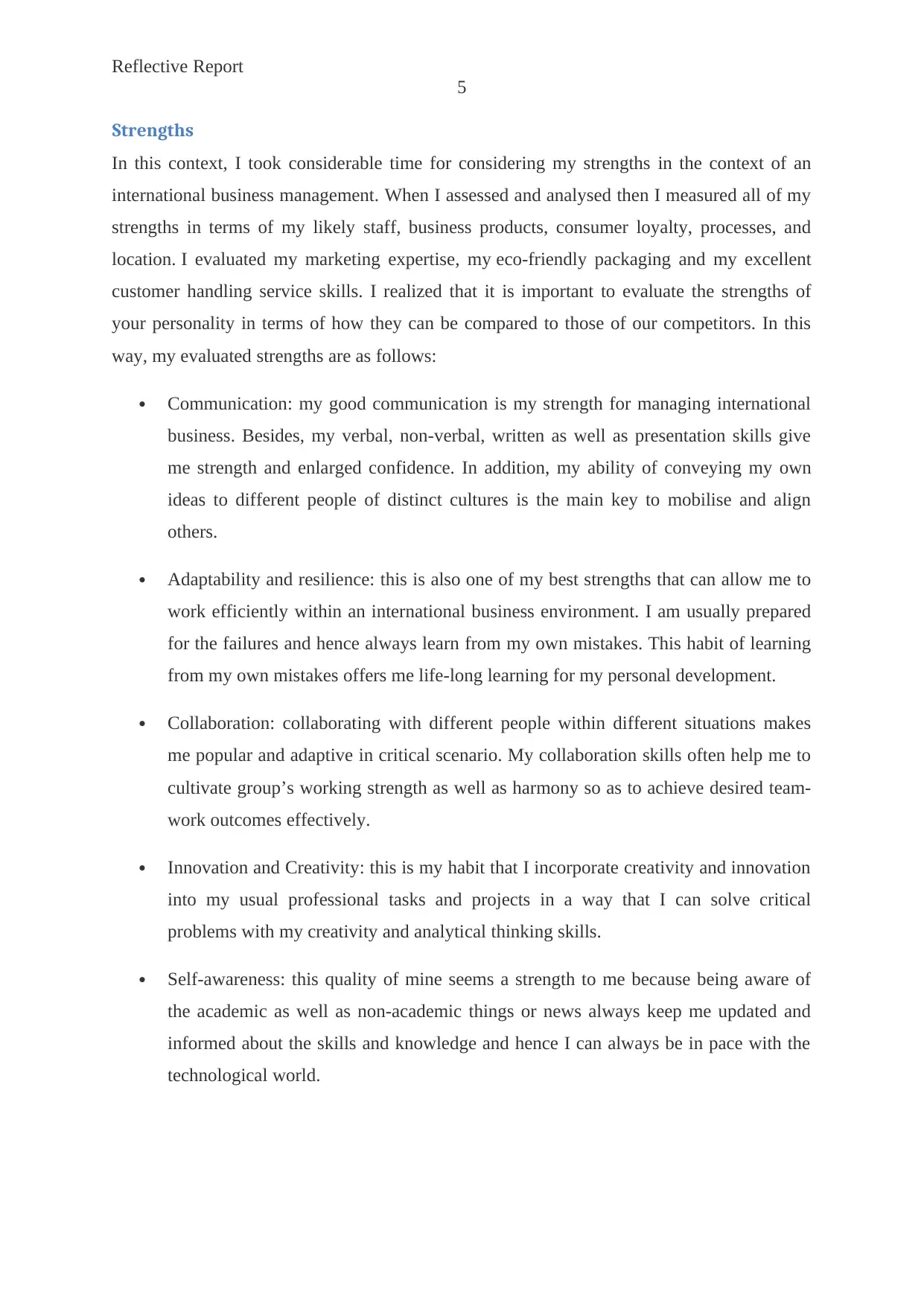
Reflective Report
5
Strengths
In this context, I took considerable time for considering my strengths in the context of an
international business management. When I assessed and analysed then I measured all of my
strengths in terms of my likely staff, business products, consumer loyalty, processes, and
location. I evaluated my marketing expertise, my eco-friendly packaging and my excellent
customer handling service skills. I realized that it is important to evaluate the strengths of
your personality in terms of how they can be compared to those of our competitors. In this
way, my evaluated strengths are as follows:
Communication: my good communication is my strength for managing international
business. Besides, my verbal, non-verbal, written as well as presentation skills give
me strength and enlarged confidence. In addition, my ability of conveying my own
ideas to different people of distinct cultures is the main key to mobilise and align
others.
Adaptability and resilience: this is also one of my best strengths that can allow me to
work efficiently within an international business environment. I am usually prepared
for the failures and hence always learn from my own mistakes. This habit of learning
from my own mistakes offers me life-long learning for my personal development.
Collaboration: collaborating with different people within different situations makes
me popular and adaptive in critical scenario. My collaboration skills often help me to
cultivate group’s working strength as well as harmony so as to achieve desired team-
work outcomes effectively.
Innovation and Creativity: this is my habit that I incorporate creativity and innovation
into my usual professional tasks and projects in a way that I can solve critical
problems with my creativity and analytical thinking skills.
Self-awareness: this quality of mine seems a strength to me because being aware of
the academic as well as non-academic things or news always keep me updated and
informed about the skills and knowledge and hence I can always be in pace with the
technological world.
5
Strengths
In this context, I took considerable time for considering my strengths in the context of an
international business management. When I assessed and analysed then I measured all of my
strengths in terms of my likely staff, business products, consumer loyalty, processes, and
location. I evaluated my marketing expertise, my eco-friendly packaging and my excellent
customer handling service skills. I realized that it is important to evaluate the strengths of
your personality in terms of how they can be compared to those of our competitors. In this
way, my evaluated strengths are as follows:
Communication: my good communication is my strength for managing international
business. Besides, my verbal, non-verbal, written as well as presentation skills give
me strength and enlarged confidence. In addition, my ability of conveying my own
ideas to different people of distinct cultures is the main key to mobilise and align
others.
Adaptability and resilience: this is also one of my best strengths that can allow me to
work efficiently within an international business environment. I am usually prepared
for the failures and hence always learn from my own mistakes. This habit of learning
from my own mistakes offers me life-long learning for my personal development.
Collaboration: collaborating with different people within different situations makes
me popular and adaptive in critical scenario. My collaboration skills often help me to
cultivate group’s working strength as well as harmony so as to achieve desired team-
work outcomes effectively.
Innovation and Creativity: this is my habit that I incorporate creativity and innovation
into my usual professional tasks and projects in a way that I can solve critical
problems with my creativity and analytical thinking skills.
Self-awareness: this quality of mine seems a strength to me because being aware of
the academic as well as non-academic things or news always keep me updated and
informed about the skills and knowledge and hence I can always be in pace with the
technological world.
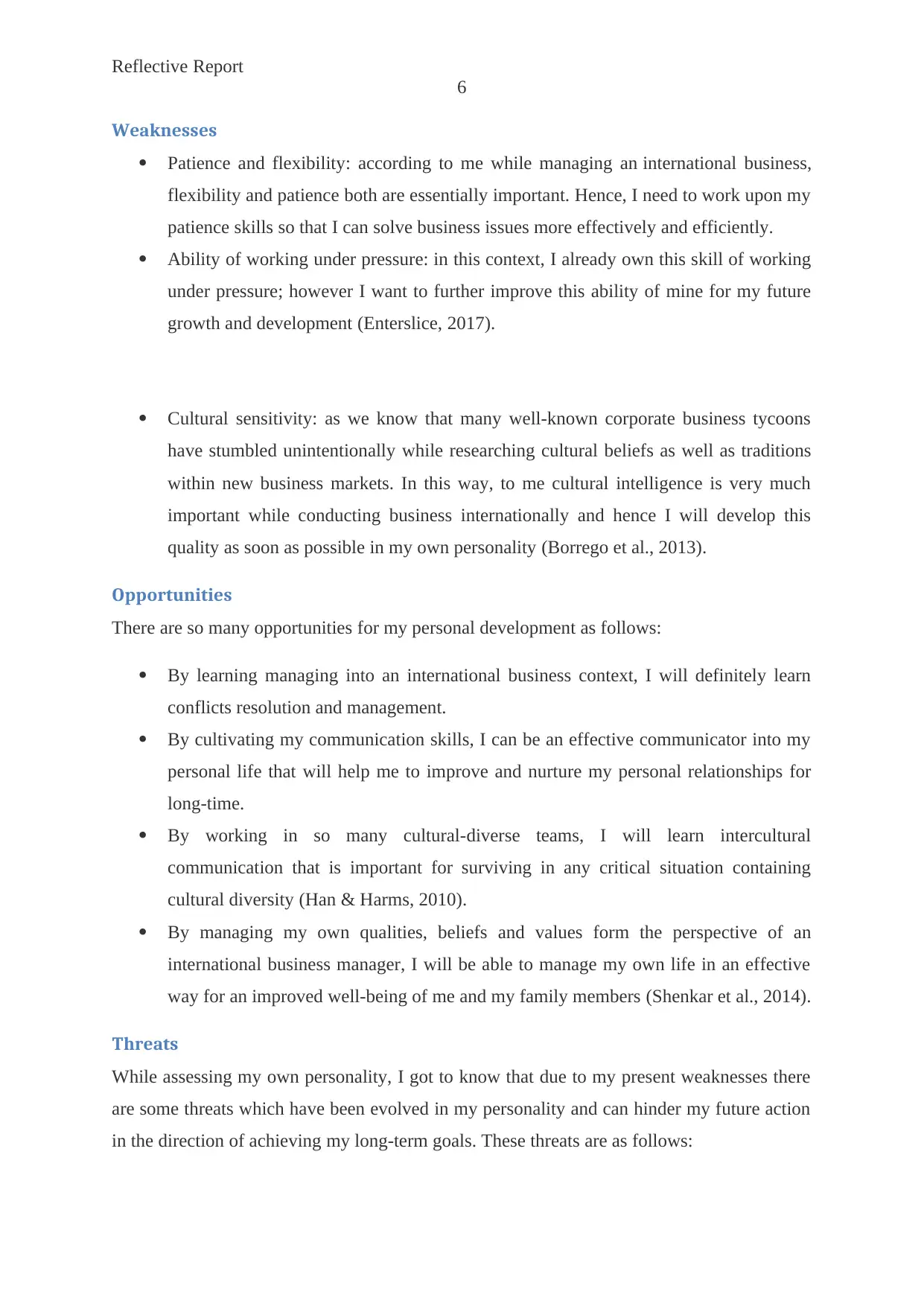
Reflective Report
6
Weaknesses
Patience and flexibility: according to me while managing an international business,
flexibility and patience both are essentially important. Hence, I need to work upon my
patience skills so that I can solve business issues more effectively and efficiently.
Ability of working under pressure: in this context, I already own this skill of working
under pressure; however I want to further improve this ability of mine for my future
growth and development (Enterslice, 2017).
Cultural sensitivity: as we know that many well-known corporate business tycoons
have stumbled unintentionally while researching cultural beliefs as well as traditions
within new business markets. In this way, to me cultural intelligence is very much
important while conducting business internationally and hence I will develop this
quality as soon as possible in my own personality (Borrego et al., 2013).
Opportunities
There are so many opportunities for my personal development as follows:
By learning managing into an international business context, I will definitely learn
conflicts resolution and management.
By cultivating my communication skills, I can be an effective communicator into my
personal life that will help me to improve and nurture my personal relationships for
long-time.
By working in so many cultural-diverse teams, I will learn intercultural
communication that is important for surviving in any critical situation containing
cultural diversity (Han & Harms, 2010).
By managing my own qualities, beliefs and values form the perspective of an
international business manager, I will be able to manage my own life in an effective
way for an improved well-being of me and my family members (Shenkar et al., 2014).
Threats
While assessing my own personality, I got to know that due to my present weaknesses there
are some threats which have been evolved in my personality and can hinder my future action
in the direction of achieving my long-term goals. These threats are as follows:
6
Weaknesses
Patience and flexibility: according to me while managing an international business,
flexibility and patience both are essentially important. Hence, I need to work upon my
patience skills so that I can solve business issues more effectively and efficiently.
Ability of working under pressure: in this context, I already own this skill of working
under pressure; however I want to further improve this ability of mine for my future
growth and development (Enterslice, 2017).
Cultural sensitivity: as we know that many well-known corporate business tycoons
have stumbled unintentionally while researching cultural beliefs as well as traditions
within new business markets. In this way, to me cultural intelligence is very much
important while conducting business internationally and hence I will develop this
quality as soon as possible in my own personality (Borrego et al., 2013).
Opportunities
There are so many opportunities for my personal development as follows:
By learning managing into an international business context, I will definitely learn
conflicts resolution and management.
By cultivating my communication skills, I can be an effective communicator into my
personal life that will help me to improve and nurture my personal relationships for
long-time.
By working in so many cultural-diverse teams, I will learn intercultural
communication that is important for surviving in any critical situation containing
cultural diversity (Han & Harms, 2010).
By managing my own qualities, beliefs and values form the perspective of an
international business manager, I will be able to manage my own life in an effective
way for an improved well-being of me and my family members (Shenkar et al., 2014).
Threats
While assessing my own personality, I got to know that due to my present weaknesses there
are some threats which have been evolved in my personality and can hinder my future action
in the direction of achieving my long-term goals. These threats are as follows:
Paraphrase This Document
Need a fresh take? Get an instant paraphrase of this document with our AI Paraphraser
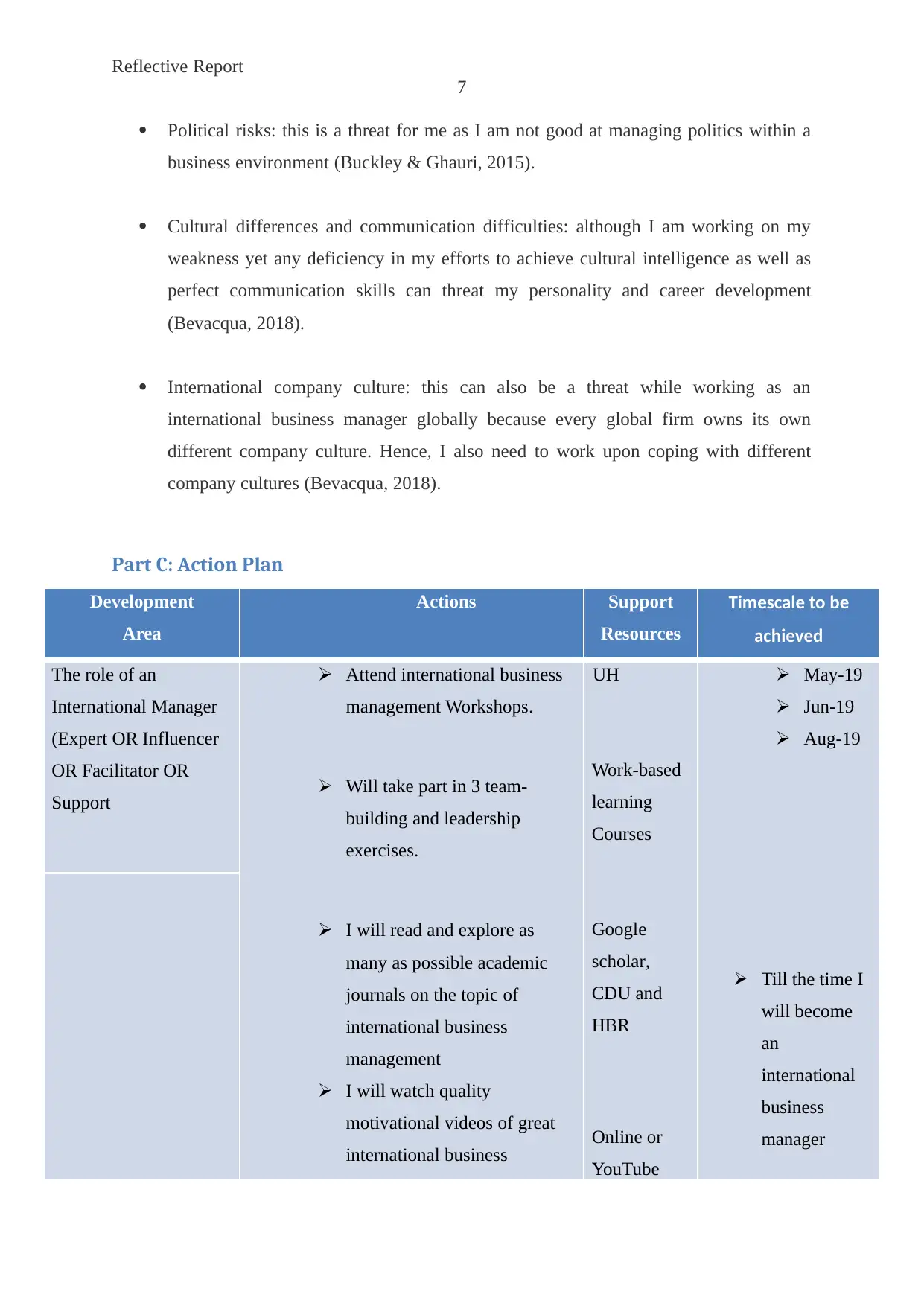
Reflective Report
7
Political risks: this is a threat for me as I am not good at managing politics within a
business environment (Buckley & Ghauri, 2015).
Cultural differences and communication difficulties: although I am working on my
weakness yet any deficiency in my efforts to achieve cultural intelligence as well as
perfect communication skills can threat my personality and career development
(Bevacqua, 2018).
International company culture: this can also be a threat while working as an
international business manager globally because every global firm owns its own
different company culture. Hence, I also need to work upon coping with different
company cultures (Bevacqua, 2018).
Part C: Action Plan
Development
Area
Actions Support
Resources
Timescale to be
achieved
The role of an
International Manager
(Expert OR Influencer
OR Facilitator OR
Support
Attend international business
management Workshops.
Will take part in 3 team-
building and leadership
exercises.
I will read and explore as
many as possible academic
journals on the topic of
international business
management
I will watch quality
motivational videos of great
international business
UH
Work-based
learning
Courses
Google
scholar,
CDU and
HBR
Online or
YouTube
May-19
Jun-19
Aug-19
Till the time I
will become
an
international
business
manager
7
Political risks: this is a threat for me as I am not good at managing politics within a
business environment (Buckley & Ghauri, 2015).
Cultural differences and communication difficulties: although I am working on my
weakness yet any deficiency in my efforts to achieve cultural intelligence as well as
perfect communication skills can threat my personality and career development
(Bevacqua, 2018).
International company culture: this can also be a threat while working as an
international business manager globally because every global firm owns its own
different company culture. Hence, I also need to work upon coping with different
company cultures (Bevacqua, 2018).
Part C: Action Plan
Development
Area
Actions Support
Resources
Timescale to be
achieved
The role of an
International Manager
(Expert OR Influencer
OR Facilitator OR
Support
Attend international business
management Workshops.
Will take part in 3 team-
building and leadership
exercises.
I will read and explore as
many as possible academic
journals on the topic of
international business
management
I will watch quality
motivational videos of great
international business
UH
Work-based
learning
Courses
scholar,
CDU and
HBR
Online or
YouTube
May-19
Jun-19
Aug-19
Till the time I
will become
an
international
business
manager
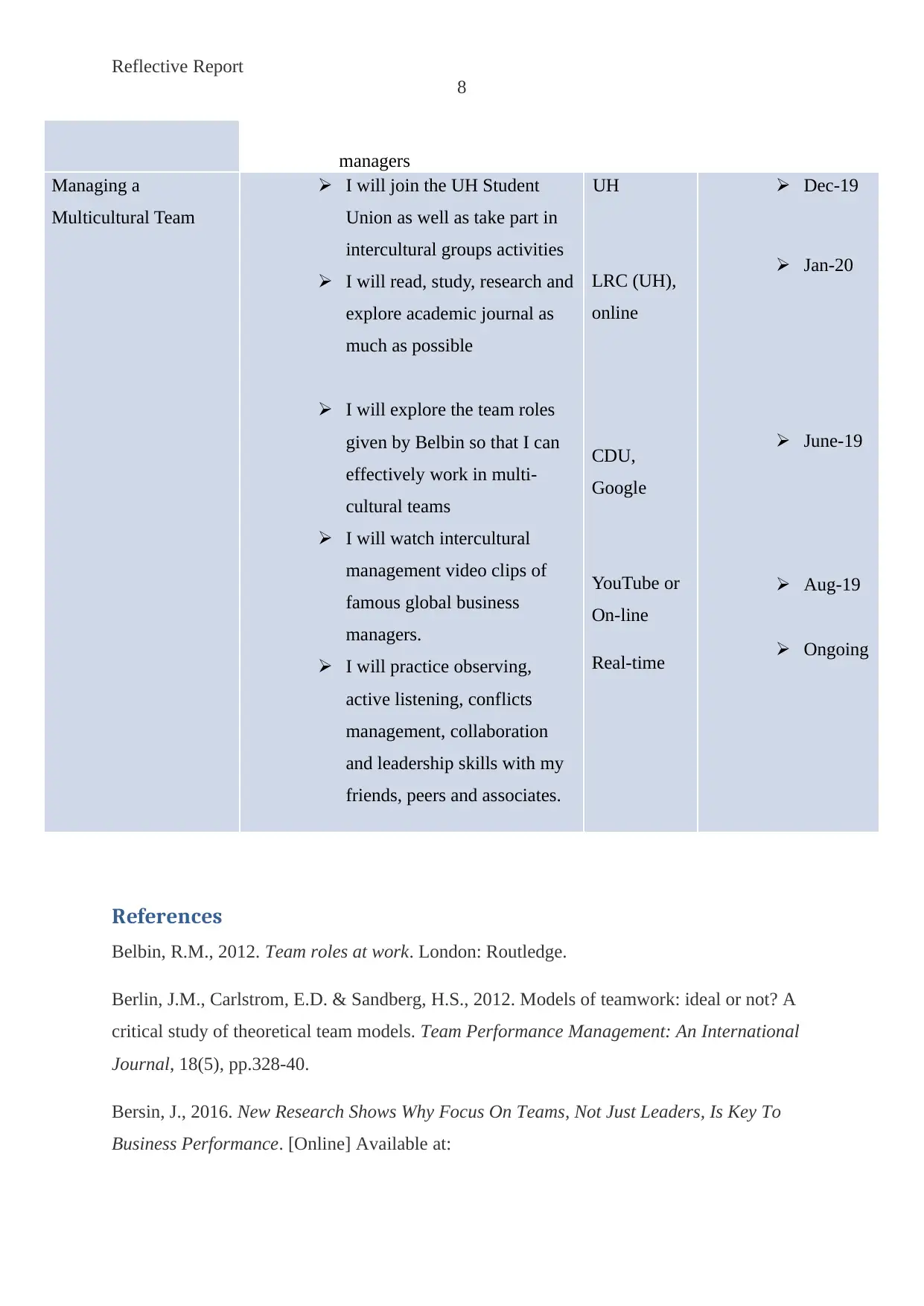
Reflective Report
8
managers
Managing a
Multicultural Team
I will join the UH Student
Union as well as take part in
intercultural groups activities
I will read, study, research and
explore academic journal as
much as possible
I will explore the team roles
given by Belbin so that I can
effectively work in multi-
cultural teams
I will watch intercultural
management video clips of
famous global business
managers.
I will practice observing,
active listening, conflicts
management, collaboration
and leadership skills with my
friends, peers and associates.
UH
LRC (UH),
online
CDU,
Google
YouTube or
On-line
Real-time
Dec-19
Jan-20
June-19
Aug-19
Ongoing
References
Belbin, R.M., 2012. Team roles at work. London: Routledge.
Berlin, J.M., Carlstrom, E.D. & Sandberg, H.S., 2012. Models of teamwork: ideal or not? A
critical study of theoretical team models. Team Performance Management: An International
Journal, 18(5), pp.328-40.
Bersin, J., 2016. New Research Shows Why Focus On Teams, Not Just Leaders, Is Key To
Business Performance. [Online] Available at:
8
managers
Managing a
Multicultural Team
I will join the UH Student
Union as well as take part in
intercultural groups activities
I will read, study, research and
explore academic journal as
much as possible
I will explore the team roles
given by Belbin so that I can
effectively work in multi-
cultural teams
I will watch intercultural
management video clips of
famous global business
managers.
I will practice observing,
active listening, conflicts
management, collaboration
and leadership skills with my
friends, peers and associates.
UH
LRC (UH),
online
CDU,
YouTube or
On-line
Real-time
Dec-19
Jan-20
June-19
Aug-19
Ongoing
References
Belbin, R.M., 2012. Team roles at work. London: Routledge.
Berlin, J.M., Carlstrom, E.D. & Sandberg, H.S., 2012. Models of teamwork: ideal or not? A
critical study of theoretical team models. Team Performance Management: An International
Journal, 18(5), pp.328-40.
Bersin, J., 2016. New Research Shows Why Focus On Teams, Not Just Leaders, Is Key To
Business Performance. [Online] Available at:
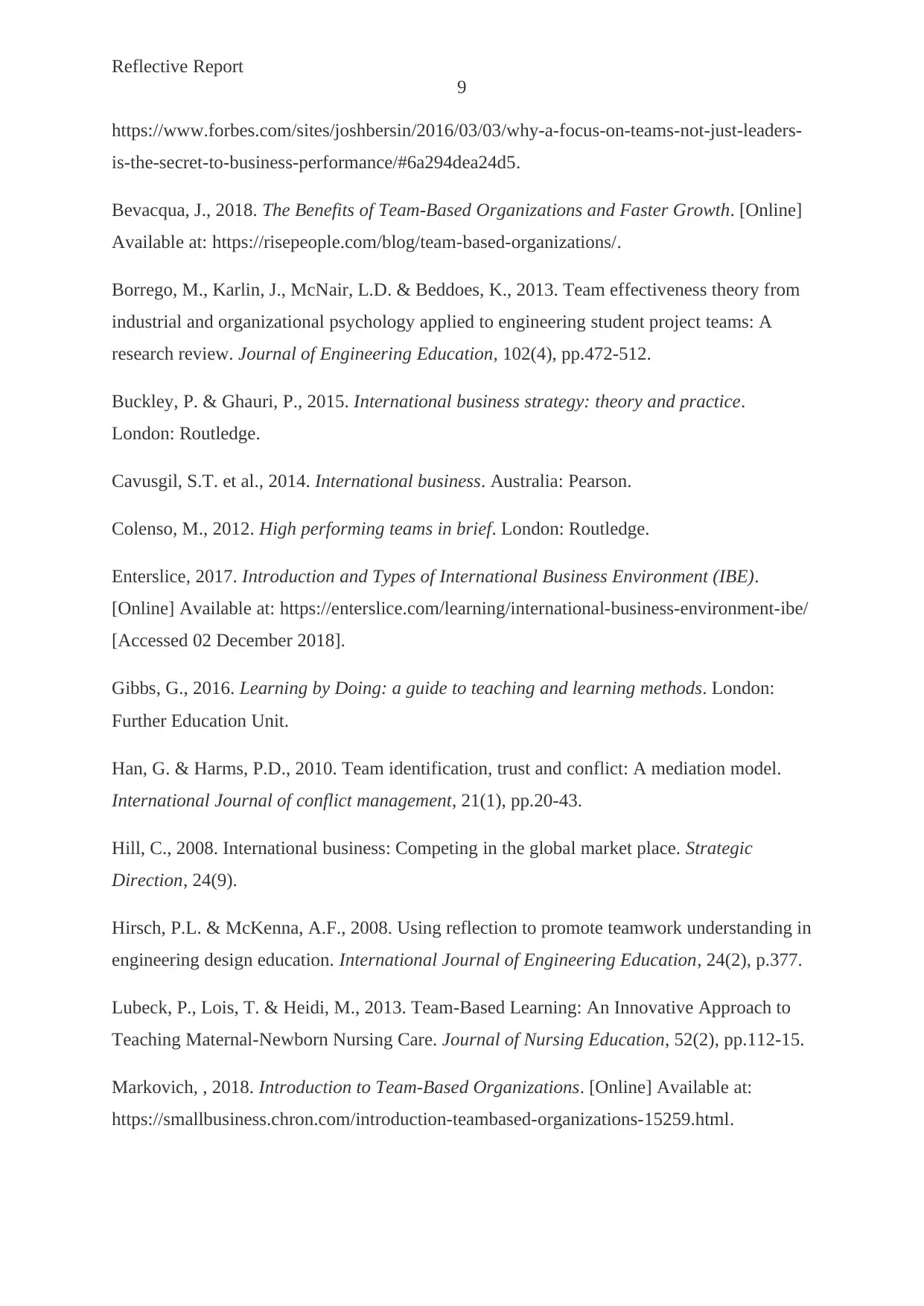
Reflective Report
9
https://www.forbes.com/sites/joshbersin/2016/03/03/why-a-focus-on-teams-not-just-leaders-
is-the-secret-to-business-performance/#6a294dea24d5.
Bevacqua, J., 2018. The Benefits of Team-Based Organizations and Faster Growth. [Online]
Available at: https://risepeople.com/blog/team-based-organizations/.
Borrego, M., Karlin, J., McNair, L.D. & Beddoes, K., 2013. Team effectiveness theory from
industrial and organizational psychology applied to engineering student project teams: A
research review. Journal of Engineering Education, 102(4), pp.472-512.
Buckley, P. & Ghauri, P., 2015. International business strategy: theory and practice.
London: Routledge.
Cavusgil, S.T. et al., 2014. International business. Australia: Pearson.
Colenso, M., 2012. High performing teams in brief. London: Routledge.
Enterslice, 2017. Introduction and Types of International Business Environment (IBE).
[Online] Available at: https://enterslice.com/learning/international-business-environment-ibe/
[Accessed 02 December 2018].
Gibbs, G., 2016. Learning by Doing: a guide to teaching and learning methods. London:
Further Education Unit.
Han, G. & Harms, P.D., 2010. Team identification, trust and conflict: A mediation model.
International Journal of conflict management, 21(1), pp.20-43.
Hill, C., 2008. International business: Competing in the global market place. Strategic
Direction, 24(9).
Hirsch, P.L. & McKenna, A.F., 2008. Using reflection to promote teamwork understanding in
engineering design education. International Journal of Engineering Education, 24(2), p.377.
Lubeck, P., Lois, T. & Heidi, M., 2013. Team-Based Learning: An Innovative Approach to
Teaching Maternal-Newborn Nursing Care. Journal of Nursing Education, 52(2), pp.112-15.
Markovich, , 2018. Introduction to Team-Based Organizations. [Online] Available at:
https://smallbusiness.chron.com/introduction-teambased-organizations-15259.html.
9
https://www.forbes.com/sites/joshbersin/2016/03/03/why-a-focus-on-teams-not-just-leaders-
is-the-secret-to-business-performance/#6a294dea24d5.
Bevacqua, J., 2018. The Benefits of Team-Based Organizations and Faster Growth. [Online]
Available at: https://risepeople.com/blog/team-based-organizations/.
Borrego, M., Karlin, J., McNair, L.D. & Beddoes, K., 2013. Team effectiveness theory from
industrial and organizational psychology applied to engineering student project teams: A
research review. Journal of Engineering Education, 102(4), pp.472-512.
Buckley, P. & Ghauri, P., 2015. International business strategy: theory and practice.
London: Routledge.
Cavusgil, S.T. et al., 2014. International business. Australia: Pearson.
Colenso, M., 2012. High performing teams in brief. London: Routledge.
Enterslice, 2017. Introduction and Types of International Business Environment (IBE).
[Online] Available at: https://enterslice.com/learning/international-business-environment-ibe/
[Accessed 02 December 2018].
Gibbs, G., 2016. Learning by Doing: a guide to teaching and learning methods. London:
Further Education Unit.
Han, G. & Harms, P.D., 2010. Team identification, trust and conflict: A mediation model.
International Journal of conflict management, 21(1), pp.20-43.
Hill, C., 2008. International business: Competing in the global market place. Strategic
Direction, 24(9).
Hirsch, P.L. & McKenna, A.F., 2008. Using reflection to promote teamwork understanding in
engineering design education. International Journal of Engineering Education, 24(2), p.377.
Lubeck, P., Lois, T. & Heidi, M., 2013. Team-Based Learning: An Innovative Approach to
Teaching Maternal-Newborn Nursing Care. Journal of Nursing Education, 52(2), pp.112-15.
Markovich, , 2018. Introduction to Team-Based Organizations. [Online] Available at:
https://smallbusiness.chron.com/introduction-teambased-organizations-15259.html.
Secure Best Marks with AI Grader
Need help grading? Try our AI Grader for instant feedback on your assignments.
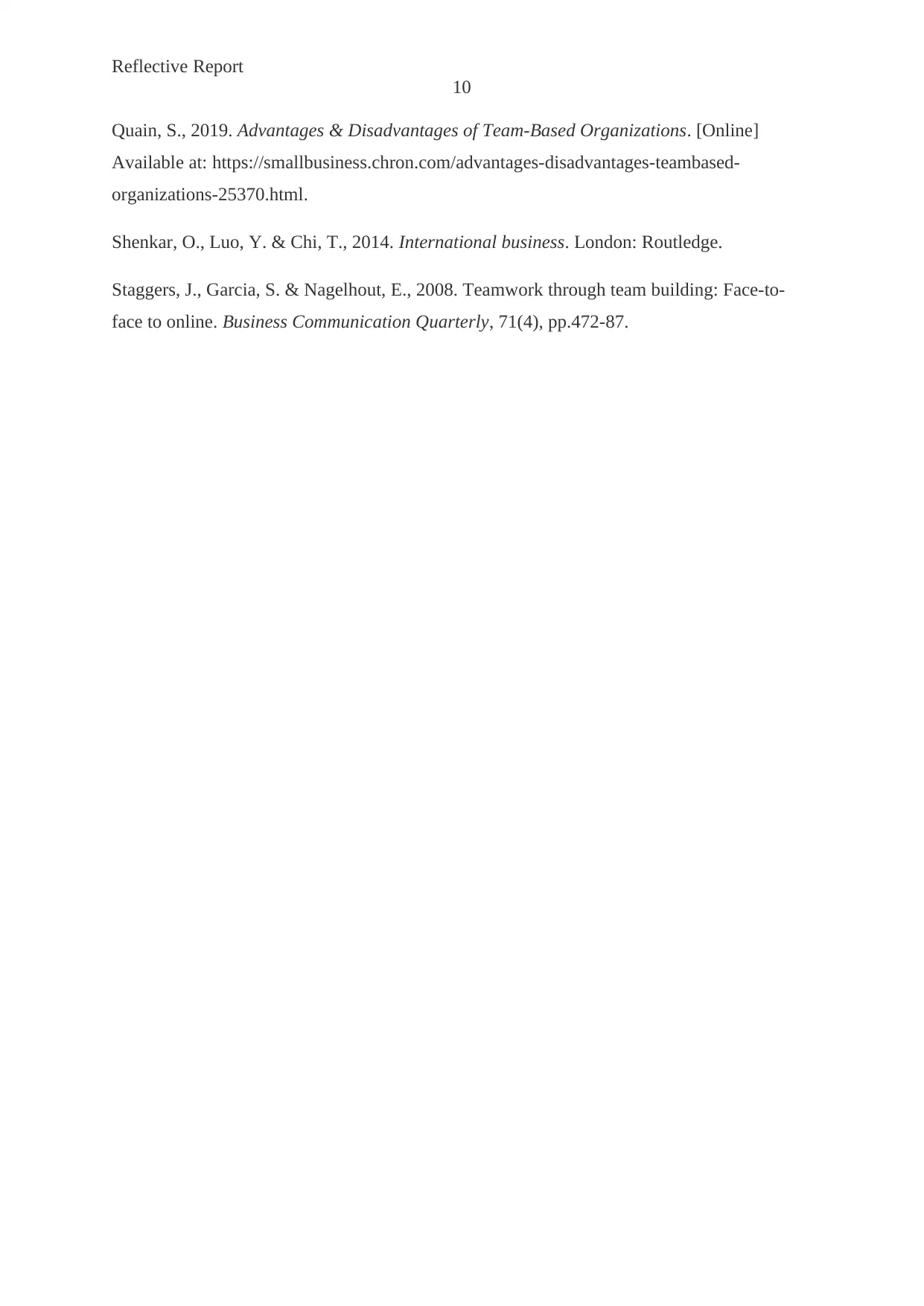
Reflective Report
10
Quain, S., 2019. Advantages & Disadvantages of Team-Based Organizations. [Online]
Available at: https://smallbusiness.chron.com/advantages-disadvantages-teambased-
organizations-25370.html.
Shenkar, O., Luo, Y. & Chi, T., 2014. International business. London: Routledge.
Staggers, J., Garcia, S. & Nagelhout, E., 2008. Teamwork through team building: Face-to-
face to online. Business Communication Quarterly, 71(4), pp.472-87.
10
Quain, S., 2019. Advantages & Disadvantages of Team-Based Organizations. [Online]
Available at: https://smallbusiness.chron.com/advantages-disadvantages-teambased-
organizations-25370.html.
Shenkar, O., Luo, Y. & Chi, T., 2014. International business. London: Routledge.
Staggers, J., Garcia, S. & Nagelhout, E., 2008. Teamwork through team building: Face-to-
face to online. Business Communication Quarterly, 71(4), pp.472-87.
1 out of 11
Related Documents
Your All-in-One AI-Powered Toolkit for Academic Success.
+13062052269
info@desklib.com
Available 24*7 on WhatsApp / Email
![[object Object]](/_next/static/media/star-bottom.7253800d.svg)
Unlock your academic potential
© 2024 | Zucol Services PVT LTD | All rights reserved.





